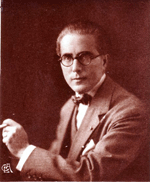9.12 Musical pedagogues in Cuban Music in the 20th Century (1900-1930).

Among the musical educators of Cuban music in the 20th century (1900-1930), we must mention Gaspar Agüero Barreras, a Cuban pianist, researcher, composer, and choir director. He was born on February 15, 1873, in the province of Camagüey. He carried out important work as a professor at the National Conservatory beginning in 1902. In 1915, he joined the Music Department at the Teacher Training College in Havana. He taught solfeggio, music theory, and composition at the Hubert de Blanck National Conservatory of Music. He was a member of the National Academy of Arts and Letters and the Economic Society of Friends of the Country.
Gaspar Agüero offered music pedagogy courses at the Ateneo. He contributed to the magazines La Gaceta Musical, edited by Serafín Ramírez, and Cuba Musical, directed by José Marín Varona.
Gaspar Agüero Barreras earned a PhD in Pedagogy and is the first Cuban music educator.
Eduardo Sánchez de Fuentes, Cuban writer, composer, educator, and historian, is the author of several books on the history of Cuban folk music. As a teenager, he composed his first internationally acclaimed piece, the habanera Tú, which was published in 1894 with a text by his brother Fernando. His most notable books include: The Aboriginal Music of America (1939); The Last Signature of Brindis de Sala; Old Cuban Rhythms (1937); Considerations on Cuban Music (1936); Ignacio Cervantes Kawanag, Eminent Pianist and Composer (1936); Contradanza and the Habanera (1935); Folklorism (1928); The Influence of African Rhythms on Our Songbook (1927); Cuba and Its Musicians; and Folklore in Cuban Music (1923).
In 1910, along with other intellectuals, he founded the National Academy of Arts and Letters, where he served as its president from 1930 to 1942. Eduardo Sánchez de Fuentes was a prominent figure who brought about important changes in music education in Cuba.
Another prominent pedagogue was César Pérez Sentenat, who also worked as a Cuban pianist and composer. Along with Gonzalo Roig and Ernesto Lecuona, he participated in the founding of the Havana Symphony Orchestra, where he served as pianist and general secretary. He also participated, along with Amadeo Roldán, in the founding of the Havana Philharmonic Orchestra in 1924. He was a piano professor at the Municipal Conservatory of Havana for a period of fifteen years, and was appointed its director in 1931.
He also contributed to the establishment of the Havana Normal School of Music with Roldán and expanded its courses, including night classes. In 1961, he took over the chair of piano and conducting at the Guillermo Tomás Conservatory (San Juan Bosco No. 57, Guanabacoa, Havana). In 1965, he was elected general director of music for the National Council of Culture (CNC) and president of the Commission for the Reform of Music Education.
One of the contributions that César Pérez Sentenat made to Cuban music and music education in Cuba was the educational series of piano music, due to the need to create materials that would show specific difficulties in learning the instrument.
Joaquín Nin Castellanos, Cuban pianist, composer, musicologist, and educator, established a concert society and a music magazine in Cuba after his return to the archipelago in 1910. He founded a pro-arts organization, the Philharmonic Society, and a publication, the Musical Bulletin. He served as director of the Havana Philharmonic Society. In February of that year, he gave his first concert at the Politeama Theater. It featured prominent figures in the musical world, such as the Spanish violinist Juan Manén.
Throughout his career, he has given lectures and piano recitals in Spain, France, Germany, England, Belgium, Denmark, Holland, Austria, Hungary, Czechoslovakia, Switzerland, Argentina, Brazil, Uruguay, and Cuba.
Among the awards and recognitions he collected throughout his career are: Knight of the Legion of Honor, Knight of the Order of Isabella the Catholic, Member of the Academy of Fine Arts of San Fernando, Honorary Professor of the Schola Cantorum of Paris, and of the New University of Brussels, Honorary Diploma of the International Academic Society of History.








